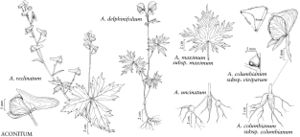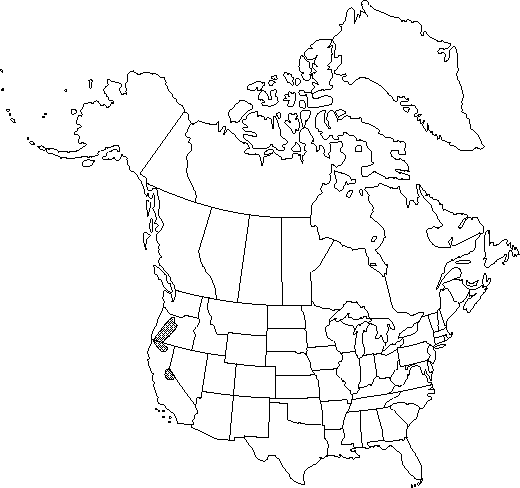Difference between revisions of "Aconitum columbianum subsp. viviparum"
Sida 16: 13. 1994.
FNA>Volume Importer |
imported>Volume Importer |
||
| (7 intermediate revisions by 2 users not shown) | |||
| Line 12: | Line 12: | ||
}}{{Treatment/ID/Special_status | }}{{Treatment/ID/Special_status | ||
|code=F | |code=F | ||
| − | |label= | + | |label=Illustrated |
}} | }} | ||
| − | |basionyms={{Treatment/ID/ | + | |basionyms={{Treatment/ID/Basionym |
|name=Aconitum viviparum | |name=Aconitum viviparum | ||
|authority=Greene | |authority=Greene | ||
| − | }}{{Treatment/ID/ | + | |rank=species |
| + | |publication_title=Feddes Repert. Spec. Nov. Regni Veg. | ||
| + | |publication_place=7: 2. 1909 | ||
| + | }} {{Treatment/ID/Basionym | ||
|name=Aconitum bulbiferum | |name=Aconitum bulbiferum | ||
|authority=Howell | |authority=Howell | ||
| + | |rank=species | ||
| + | |publication_title= | ||
| + | |publication_place=1897 | ||
}} | }} | ||
|synonyms={{Treatment/ID/Synonym | |synonyms={{Treatment/ID/Synonym | ||
|name=Aconitum columbianum var. howellii | |name=Aconitum columbianum var. howellii | ||
|authority=(A. Nelson & J. F. Macbride) C. L. Hitchcock | |authority=(A. Nelson & J. F. Macbride) C. L. Hitchcock | ||
| − | }}{{Treatment/ID/Synonym | + | |rank=variety |
| + | }} {{Treatment/ID/Synonym | ||
|name=Aconitum hansenii | |name=Aconitum hansenii | ||
| − | |authority= | + | |authority= |
| + | |rank=species | ||
}} | }} | ||
|hierarchy=Ranunculaceae;Aconitum;Aconitum columbianum;Aconitum columbianum subsp. viviparum | |hierarchy=Ranunculaceae;Aconitum;Aconitum columbianum;Aconitum columbianum subsp. viviparum | ||
| Line 35: | Line 43: | ||
}}<!-- | }}<!-- | ||
| − | --><span class="statement" id="st- | + | --><span class="statement" id="st-undefined" data-properties=""><b>Bulbils </b>conspicuous in leaf axils and sometimes in inflorescence in place of flowers. <b>2n</b>=18, 19, 20.</span><!-- |
-->{{Treatment/Body | -->{{Treatment/Body | ||
| Line 42: | Line 50: | ||
|elevation=900-2500 m | |elevation=900-2500 m | ||
|distribution=Calif.;Oreg. | |distribution=Calif.;Oreg. | ||
| − | |discussion=<p>One group of populations occurs in the Sierra Nevada, south of Lake Tahoe, in California. Another group of bulbiferous populations begins ca. 350 miles north in the Klamath Mountains of California and extends to northern Oregon in the Cascade Range. These bulbiferous populations form a geographically and morphologically distinct group. We have not noted intergradation between bulbiferous and nonbulbiferous subspecies of A. columbianum.</p><!-- | + | |discussion=<p>One group of populations occurs in the Sierra <i>Nevada</i>, south of Lake Tahoe, in California. Another group of bulbiferous populations begins ca. 350 miles north in the Klamath Mountains of California and extends to northern Oregon in the Cascade Range. These bulbiferous populations form a geographically and morphologically distinct group. We have not noted intergradation between bulbiferous and nonbulbiferous subspecies of <i>A. columbianum</i>.</p><!-- |
| − | --><p>Bulbils are an effective means of vegetative reproduction. They fall to the ground late in the season and sprout vigorously, giving rise to new plants. Bulbil production should not be confused with the production of one to several small daughter tubers at the first few nodes above the parent tuber, usually below ground, which can occur on a small percentage of the plants in bulbiferous and nonbulbiferous populations. In other respects, these bulbiferous populations are similar to adjoining races of Aconitum columbianum subsp. columbianum.</p> | + | --><p>Bulbils are an effective means of vegetative reproduction. They fall to the ground late in the season and sprout vigorously, giving rise to new plants. Bulbil production should not be confused with the production of one to several small daughter tubers at the first few nodes above the parent tuber, usually below ground, which can occur on a small percentage of the plants in bulbiferous and nonbulbiferous populations. In other respects, these bulbiferous populations are similar to adjoining races of <i>Aconitum columbianum </i>subsp.<i> columbianum</i>.</p> |
|tables= | |tables= | ||
|references= | |references= | ||
| Line 52: | Line 60: | ||
-->{{#Taxon: | -->{{#Taxon: | ||
name=Aconitum columbianum subsp. viviparum | name=Aconitum columbianum subsp. viviparum | ||
| − | |||
|authority=(Greene) Brink | |authority=(Greene) Brink | ||
|rank=subspecies | |rank=subspecies | ||
| Line 66: | Line 73: | ||
|publication title=Sida | |publication title=Sida | ||
|publication year=1994 | |publication year=1994 | ||
| − | |special status=Endemic; | + | |special status=Endemic;Illustrated |
| − | |source xml=https:// | + | |source xml=https://bitbucket.org/aafc-mbb/fna-data-curation/src/2e0870ddd59836b60bcf96646a41e87ea5a5943a/coarse_grained_fna_xml/V3/V3_14.xml |
|genus=Aconitum | |genus=Aconitum | ||
|species=Aconitum columbianum | |species=Aconitum columbianum | ||
|subspecies=Aconitum columbianum subsp. viviparum | |subspecies=Aconitum columbianum subsp. viviparum | ||
| − | |||
| − | |||
}}<!-- | }}<!-- | ||
-->[[Category:Treatment]][[Category:Aconitum columbianum]] | -->[[Category:Treatment]][[Category:Aconitum columbianum]] | ||
Latest revision as of 21:46, 5 November 2020
Bulbils conspicuous in leaf axils and sometimes in inflorescence in place of flowers. 2n=18, 19, 20.
Phenology: Flowering summer (Jul–Sep).
Habitat: Spring-fed bogs, seep areas, meadows, along streams, and other moist areas in mountains
Elevation: 900-2500 m
Discussion
One group of populations occurs in the Sierra Nevada, south of Lake Tahoe, in California. Another group of bulbiferous populations begins ca. 350 miles north in the Klamath Mountains of California and extends to northern Oregon in the Cascade Range. These bulbiferous populations form a geographically and morphologically distinct group. We have not noted intergradation between bulbiferous and nonbulbiferous subspecies of A. columbianum.
Bulbils are an effective means of vegetative reproduction. They fall to the ground late in the season and sprout vigorously, giving rise to new plants. Bulbil production should not be confused with the production of one to several small daughter tubers at the first few nodes above the parent tuber, usually below ground, which can occur on a small percentage of the plants in bulbiferous and nonbulbiferous populations. In other respects, these bulbiferous populations are similar to adjoining races of Aconitum columbianum subsp. columbianum.
Selected References
None.

